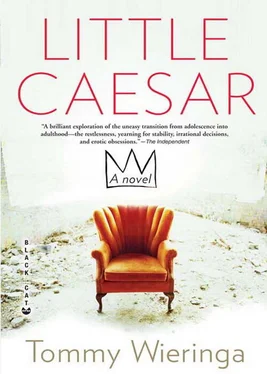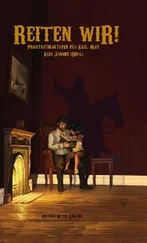I got up and walked to the bar. The woman put down her glass and nodded at me. From behind the tap, Leland was gesturing to me. What he really wanted to do was yell, like in the rugby club on a Saturday morning after the match. He put a pint down in front of me.
‘Good job, Ludwig. Spot on for an evening like this.’
‘It was okay, I figured.’
‘They were over the moon. What you do is pure cinema, man. With someone like you in the place they think they’re on the Titanic , or in a bar in Casablanca.’
The beer sang its way through my body. Maybe I’d hang around here for a while, wait for spring to come, at home and away from home, a little cloud of dust that settles.
I ran into her the next day on the esplanade, the woman from the bar. Her name was Linny Wallace. She said I’d played nicely last night.
‘Particularly Gershwin, you put a lot of feeling into that.’
I told her I liked Gershwin, his lightness, which seemed American to me.
‘I’ve never seen you around before,’ she said.
‘Just got into town on Wednesday.’
She worked as an estate agent in Reading. On the beach, in the distance, people were walking their dogs. I told her I had come for a funeral, but had stumbled on this job while I was waiting. That it was, after a fashion, a homecoming, because my mother and I used to live up there on the cliff. We had left this place twelve years ago. Maybe I would stick around for a couple of months, springtime was lovely here.
‘And after that, what will you do then?’ she asked.
‘After that I don’t know. I’m a grasshopper, I play music while the sun shines.’
‘But you cadge firewood from the ant when you get cold,’ said Linny Wallace.
We followed the walkway south; in the distance you could clearly see the outlines of the reactor at Sizewell — its dome gleamed in the sun.
‘I figured you more for someone who belongs on the boulevard at Cannes,’ she said.
When she laughed, you could see that she was older than me. On Avondale Street we stood and watched an old man and his dog. The animal sat on its backside and used its front legs to pull itself across the pavement, to scratch its itching anus.
‘I’ve never seen anything like it,’ Linny Wallace said. ‘As though he’s sledding. .’
I said nothing about impacted anal glands, which a pair of expert hands could easily squeeze clean.
A sort of cheerfulness settled down between us, we laughed at the many expressions of old, guttering life that could be seen around the village. God’s waiting room, it was sometimes called; Alburgh had the highest death rate in all of England. Paradoxically enough, that had to do with the favorable conditions one found here for carefree sunset years. The local shopkeepers lived in the calm certainty of uninterrupted revenues from countless pensions; restaurants and teahouses offered senior citizen discounts of up to twenty percent.
I told her how, just yesterday, I had stood in the doorway of an off-license, looking at an old man standing beside his scootmobile and messing with his gloves. When I left the shop a few minutes later he was still there. He lived in a different time-space continuum, where you could take a hundred years to put on your gloves without growing impatient.
From the old days, when I had walked these streets as a boy, I remembered the man who stood still at unexpected places. He always seemed to be deep in thought, in search of who he was and what kind of life he led. When he stopped he would wave his shaky hands out in front of him, carving mysterious symbols in the air or, with a bit of fantasy on the viewer’s part, conducting an orchestra of invisible mice.
Alburgh had also gained a certain fame for the large number of hardwood benches in its public spaces. They were everywhere, along the esplanade, by the golf course, beside the pub; simple benches donated by survivors for the public good. The backrests bore inscriptions showing to whose memory the bench was dedicated.
My loving husband, he loved Alburgh deeply.
In view of sea and sail.
To all those here, nipping at their pints. Think of Tom.
Ginger Tooke, a spry little woman, had once given guided tours past the benches; she knew the stories behind many of the inscriptions. For all I knew, Ginger Tooke herself might meanwhile have passed on to her next incarnation as a hardwood bench along the esplanade.
I had to get back to the hotel for my afternoon shift. Linny and I walked into the place like excited children. I ran upstairs to iron a shirt. On my voicemail I found another message from my former employer. The poison was not yet out of his stinger.
‘Ludwig? This is Peter. Hope you still remember me. You’ll never play here again. I sent a fax to the whole hotel chain. And, oh yeah, I’ve filed a claim against you. Violation of contract. I know what you’re thinking, but an oral agreement counts too. In court. You’ll hear more about it. Asshole.’
I opened another little text folder. Mi amor. Where are you? I don’t deserve this. F.
I had no idea who F. was. My telephone didn’t recognize her number. I thought about the Spanish salutation, but that didn’t really say anything: the language of love is a confusion of tongues. I deleted the message. The battery still showed one little stripe of energy.
There were a few guests in the lounge, sitting in orange easy chairs and reading thrillers and newspapers. Two waiters had rolled the piano into the room. Linny Wallace was squatting down beside the stone hearth, poking up the glowing heart of the fire. The head waiter, a mere boy, was staring attentively at her ass. He was the liaison between bar and lounge. Children were playing on the olive-green carpet. I sat down at the piano and leafed through the bundle of sheet music. When I flagged him down, the waiter came over to me with a rather wobbly gait.
‘Could you bring me a daiquiri?’
His knitted brow sank into a dip above the bridge of his nose; it looked as though he were about to ask huh?
‘I’m not sure we have that,’ he said.
‘It’s a mixed drink, you can make it.’
Finding out whether this was within the realm of possibility was something about which he didn’t seem particularly keen. The word itself, I suspected, would disappear from his mind halfway between here and the bar, like a copper falling out of your pocket.
‘Could you tell me the name again. Perhaps Mr. Leland knows what it is.’
‘Dai-qui-ri. I’m sure he does.’
The boy shuffled over to the door, his shirttail hanging out of the back of his trousers. The look of his backside was as lifeless as the one on his face.
I had copied the music onto A5 sheets, so I didn’t have to turn the pages as quickly. A few bits from Tchaikovsky’s ballets, for starters, ‘The Waltz of the Flowers’ from The Nutcracker , then a waltz from The Sleeping Beauty . My shoes creaked on the pedals, I really hated that sound. After Tchaikovsky I swung out into Mozart. In the pause between two Sonatines Viennoises , Leland came into the lounge.
‘What did you ask the poor lad for?’ he whispered. ‘A do-re-mi?’
‘A daiquiri,’ I whispered back.
Leland shook his head.
‘A daiquiri, bloody hell.’
He nodded deferentially to the guests who were peering at us over newspapers and the tops of reading glasses. A few minutes later the boy came in with a daiquiri in a cone-shaped glass, with a layer of sugar around the rim, just the way I liked it.
Linny was thrilled by how I brought Mozart to life. Outside, the darkness slipped into streets and doorways; in the lounge, the dry logs crackled on the fire. I remembered a similar afternoon, long ago in Vienna. My mother and I had stayed there for a few weeks while she was doing Josephine Mutzenbacher’s 1000-and-1 Night . On that gray December afternoon, I had left our hotel on the Kärntner Ring and took the bus to the Sankt Marxer Friedhof, in search of Mozart’s cenotaph. I wasted so much time trying to find the right bus that it was growing dark by the time I reached the graveyard. The gate was already locked. Through the bars, the only living thing I saw amid the graves was a little white dog. Going around to the side of the cemetery, I scaled the low wall with the help of an elderberry bush. I wandered at random between the trees, with dark webs spun in their crowns. Here, somewhere, was where they had buried him after sunset, on 5 December 1791. The official burial act spoke of an einfachen allgemeinen Grab , but which plain grave it was, they had apparently forgotten right away.
Читать дальше












